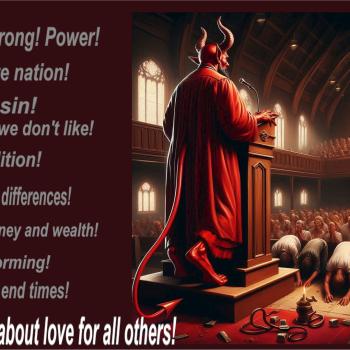Many today insist that faith is one thing, something irrational, and reason is something completely other. But it isn't easy to disentangle the two. Faith isn't irrational belief when there's no reason to believe that our articles of faith are true. Reason isn't the geometric certainty machine that some rationalists have tried to pretend it is. Faith doesn't preclude evidence or persuasion, and reason requires faith, trust.
For me, Emmanuel Levinas's argument that reason is founded in the obligation of human relation is persuasive. It is a very short step to the claim that reason is founded in faith, not necessarily religious faith, but faith, in other words trust. If there is a God and that God is a person, then Levinas's argument also makes religious faith more fundamental than reason. So let me give a description of how I think about the intertwined relationship between faith and reason, recognizing the debt to Levinas that lies behind it and focusing on thinking about reason.
Suppose we begin with the assumption that rational accounts have persuasion at their heart. Not because etymologies are good sources for establishing the meaning of words but because they can sometimes help us think creatively about words, consider the etymology of persuasion. Persuade has Latin roots: per + suadeo, per- indicating movement or change and suadeo, from the IndoEuropean root swad-: "what is made sweet or pleasant." Persuadeo means "to recommend," "to advocate," "to urge or suggest," and "to advise"; thus, straightforwardly, the Latin root means "to urge, recommend, suggest, or advise change."
On the face of it, we seem to find in the Latin something very much like our own use of persuade. But notice that each of the meanings in Latin indicates also a gesture of friendship. Given that, we can understand persuadeo implicitly to mean "to move in the direction of what becomes pleasant." The implicit assumption of the Latin word seems to be that something wasn't previously pleasant and has become so through persuasion, the persuasion of a friend.
This theme of friendship as an element of persuasion is startling. What kinds of things are involved in persuasion if we understand it as a function of friendship? For Aristotle the first mark of friendship is love. This love is nonromantic, where romantic has its usual, nonphilosophical meaning. In other words, this love is nonexclusionary — loving one friend does not exclude loving another. And it is a love that emanates in goodwill, mutual recognition, and shared activity, as well as (or perhaps irrespective of) fondness for the other. For the prophets and apostles this friendship is also best exemplified in love, the pure love of Christ (Romans 8:35-39; Ephesians 3:19; Moroni 7).
The friendship of persuasion also always involves faith, a trust in those who speak and in those who hear. One need not be religious to see this point. Following Levinas, Jacques Derrida has said "There is no morality without faith, faith in the other. There is no social experience without bearing witness, without attestation, the recognition of a dimension of trust and faith. This is not a religious point; it is the general structure of experience" (private discussion, Paris, 1 March 1996). The first of the early LDS Lectures on Faith made a similar point more than one hundred years ago, and it presumably echoes what the Prophet Joseph Smith believed.
Without that trust and faith, part and parcel of friendship, persuasion is impossible. In matters divine, persuasion involves trust in God, who both speaks and hears and to whom we both listen and speak. Sweet persuasion turns out to be a trusting, loving testimony and revelation to another whom one esteems and trusts, and this is true not only in the religious realm, but also in the secular: to persuade of something is to offer one's testimony of it, to reveal it to the other, to give it as a gift given in friendship. Thus, testimony and revelation are not a different kind of knowing, an alternative to reason. They are the very foundation of all reason, including the narrow reason of Cartesian geometric thought.
On this account persuasion is what the medievals called "gentle" or "sweet" rhetoric. Reason is what leads us gently to the certainty of the Good. Further, on this account, persuasion is oriented to performance. It is something we do together. Thus, the necessity of faith.
The point of persuasion is not to convince the other person that I am right, in spite of what he or she would otherwise believe and irrespective of who each of us is. The point of persuasion is not the end of speech in a fixed certainty that has essentially nothing to do with those involved in the discussion (except to act as that thing before which we must bow in acquiescence). Instead, the point of persuasion is to bring about change, a change in us, in our relationship, and, consequently, in the world. It is repentance in the broad sense.
The use of reason is essentially ethical activity. It is what one does for and in the presence of a friend, not what coerces any other to believe. Reason is the power of Christ, not the power of Satan.
12/2/2022 9:09:21 PM





